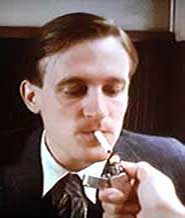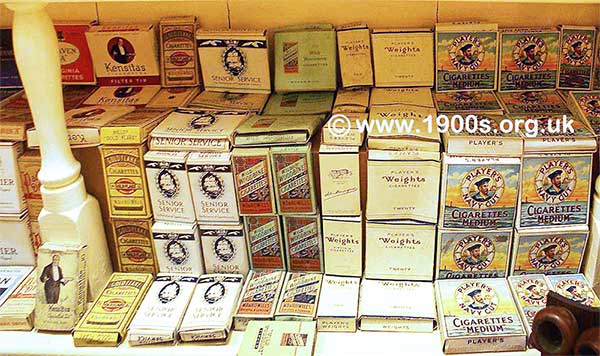Smoking and health: as it affected your ancestors

This page shows that there were sound arguments against smoking as early as the 1940s and it explores why the majority of smokers nevertheless continued to smoke. The page goes on to suggest reasons why the UK Government took so long to ban cigarette advertising and require health warnings on cigarette packets. For other aspects of smoking, see above menu.
____
By the webmaster, based childhood observations and additional research
Arguments against smoking in the past
Today, the most serious case against smoking is that it damages health. It was not always so. In the 1940s and 50s and before, it was not absolutely proven that smoking damaged health. If it had been, most people would probably never have started.
There were of course other sound arguments against smoking that were well-recognised, although people at the time hardly noticed them because things had always been that way. Here are some examples:
Addiction
Addiction was not a word used in connections with smoking. Smokers told themselves that they could give up whenever they wanted to, even though. Some did, but thousands didn't and couldn't much as they tried.
Prices of cigarettes go up and up at every Budget
Smokers were always a target for increased taxes. My father was addicted, and every Budget when the Chancellor put up the tax on cigarettes and hence their price, my father would vow to give up - but he could never manage it. My mother, probably like lots of housewives of the time, would go along with his addiction and say that he had to have some pleasure. My parents always said that they were short of money, and I did wonder which particular pot the extra spending would come out of. My father did eventually die of lung cancer.
Personal appearance
I always wondered why the beards and moustaches of older men looked pale and yellowy round their mouths and noses. Only later did I realise that it was from the smoke of tobacco. These men had yellow teeth too. It was always the older men. By the 1940s and 50s, younger men no longer wore beards. Either they were clean-shaven or they kept their moustaches short on their upper lips. As these grew quickly and were cut often it was only their teeth that had started yellowing.
Smell
In my childhood, houses tended to reek of stale tobacco smoke, and cinemas and trains always did too. We children, almost without exception, lived in households where at least one adult smoked. So our clothes and hair also smelt of stale tobacco smoke. Not that any of us thought much about it at the time because we knew nothing else. Anyway, the smell had to be lived with as clothes were not washed as often then as now because electrically powered washing machines - the twin tubs - did not start coming onto the market until the 1950s.
Smokers' cough
I don't recall smokers having a perpetual spluttering cough. The term 'smoker's cough' is more recent and has almost become a joke or, in more serious cases, a pejorative accusation.
So why did people choose to smoke?
Smoking was considered normal.
Smoking was permitted and accepted in most public places. It was quite usual and acceptable to be stopped in the street by a complete stranger and asked if one had a light - presumably because the individual concerned had run out of matches or petrol for his lighter. It seemed the friendly thing to do to provide the light where one could. No-one seemed concerned at being approached by a perfect stranger if he or she was a fellow smoker.

Smoker receiving a light from someone else. You can see from the position of the hand that the smoker himself is not holding the lighter.
Men and smoking
All men seemed to smoked while I was growing up. Men had of course smoked in previous years, from way before I was born. Presumably they enjoyed it, but peer pressure was part of it. To be 'in' with one's group, one had to smoke - from the gentlemen who smoked their cigars after a convivial dinner, to the working men who spent their evenings in pubs to the tramps tramping from one night's accommodation to the next.
Women and smoking
My mother told me that although it was not thought acceptable for 'nice' women to smoke in Victorian and Edwardian times, things started to change in the 1920s and 1930s. Women started regarding it sophisticated to smoke cigarettes from long and elegant cigarette holders which kept the smoke away from their faces, and it became acceptable for men to offer cigarettes to women.

Woman smoking through a cigarette holder

Women's cigarette holder. There were much longer ones
In fact, cigarette accessories were rather akin to jewellery in the minds of those who used them.
Why didn't the Government take action to limit smoking?
As many of the arguments against smoking were well-known years before any Government action was taken, it is worth asking why.
Government needed the income from taxes
One reason has to be that governments are always short of money and smoking was very heavily taxed. Furthermore, they knew from experience that when they increased the tax - and hence the price of cigarettes - as they frequently seemed to in the late 1940s and 50s, enough people were sufficiently addicted to accept it, even though they complained.
Not everyone accepted the increased prices and did manage to give up - as explained in the following box.
The Budget increases in tobacco taxes did make some men give up smoking
In his 1961 Budget, the Chancellor put 6d (old money) on a packet of 20 cigarettes.
As an impoverished National Serviceman in the RAF who was paid 7/6d per day, 4/6d per packet of cigarettes represented a lot of money. After a number of failed attempts to give up smoking, this reform galvanised me into action and I stopped immediately, never to smoke a cigarette again.
Anthony Asquith,
as quoted in The Daily Telegraph 22 November 2017
Government needed to keep up the spirits of the armed forces
A second reason was that smoking kept the armed forces' spirits up during the war. They were even encouraged to smoke by being supplied with free tobacco. If this led to addition - well, it was important to win the war.
contributed by Desmond Dyer
My eldest brother was in the Navy during the war, and when he came home on leave he would usually have large one-pound tins of Navy Tobacco, from which my father used to pay me to make his 'roll ups' cigarettes.
contributed by Douglas Adam, informal historian
It was felt important for morale that cigarettes remained easily available during the 1940-45 Second World War in spite of the rationing and shortages of most commodities. So cigarettes were readily available from vending machines. A packet of ten cost six old pennies and a packet of 20 cost as shilling (5p in today's money).
The tobacco lobby
The 'tobacco lobby' was a collective name for the individuals, organisations, and interest groups within the tobacco industry who worked on government policies and decisions to influence them in their favour. The tobacco lobby was powerful and no government of the time could afford to offend it even if they had wanted. Some indication of its size can be seen from the large range of cigarettes on sale at the time, as shown in the following photo, but the tobacco industry was involved in many more tobacco-related commodities, see for example the above menu or the search box on the home page.

Large range of cigarettes on show in a mid-20th century tobacconist shop: Craven A; Kensitas; Senior Service; Woodbine; Players Weights; Players Navy Cut - an indication of the size of the tobacco lobby.
Government action
Actual evidence that smoking damaged health gradually accumulated in the 1950s, but it was the USA's 1964 Report on Smoking and Health that galvanised action. It concluded that average smokers had a nine-to-ten-fold risk of developing lung cancer compared to non-smokers and that heavy smokers had at least a twenty-fold risk.
There is a great deal of information on the internet about the resulting actions that were and were not taken worldwide and here is not the place for them. Suffice it to say that in the UK, all television commercials for cigarettes were banned from 1 August 1965, and health warnings on cigarette packets were required from 1971.
| sources | webmaster | contact |
Text and images are copyright
If you can add anything to this page or provide a photo, please contact me.



